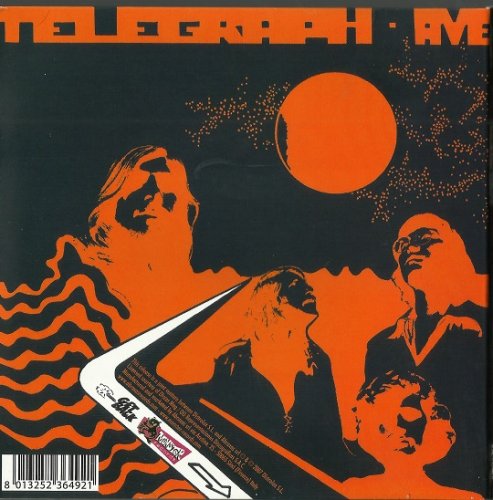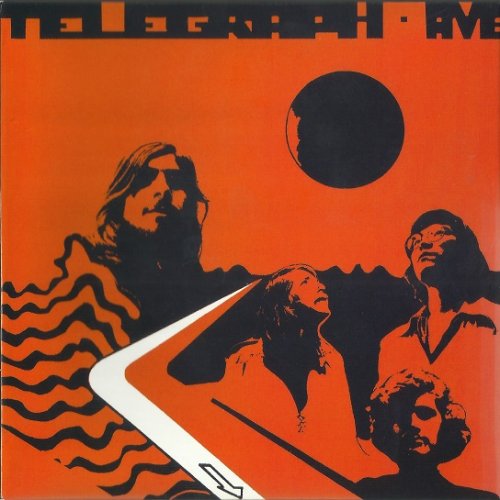
Telegraph Avenue - Telegraph Avenue (Reissue) (1971/2007)
BAND/ARTIST: Telegraph Avenue
- Title: Telegraph Avenue
- Year Of Release: 1971/2007
- Label: Get Back
- Genre: Psychedelic Rock, Jazzy Folk Rock
- Quality: Mp3 320 / Flac (image, .cue, log)
- Total Time: 31:36
- Total Size: 92/204 Mb (scans)
- WebSite: Album Preview

Tracklist:
1. Something Going (Alex Nathanson) - 4:45
2. Happy (Bo Ichikawa, Chachi Luján) - 3:41
3. Sweet Whatever (Alex Nathanson, Walo Carrillo) - 2:47
4. Lauralie (Alex Nathanson) - 4:05
5. Sungaligali (Bo Ichikawa, Chachi Luján) - 4:05
6. Let Me Start (Bo Ichikawa, Chachi Luján) - 4:05
7. Sometimes In Winter (Bo Ichikawa, Chachi Luján) - 5:26
8. Telegraph Avenue (Bo Ichikawa) - 3:53
Line-up:
Bo Ichikawa - Xylophone, Acoustic Guitar, Harmonica , Guitar, Vocals
Chachi Luján - Acoustic Guitar, Percussion, Congas, Vocals
Alex Nathanson - Acoustic Guitar, Clavichord, Bass, Alto Vocals*Walo Carrillo - Maracas, Tambourine, Percussion, Drums, Vocals
The middle of 1969 saw the development one of the most interesting groups of the Lima music scene: Telegraph Avenue (who took their name from a famous avenue in San Francisco), the only four-piece band that included melodic vocals that clarified their music, a mixture of psychedelic rock with Latin rhythms. Telegraph Avenue was formed with Bo Ichikawa and Chachi Luján on the guitars, Alex Nathanson on bass, and Walo Carrillo on drums; all the members also played additional instruments on the band’s recordings. From the moment of their formation, Telegraph Avenue was completely dedicated to composing their own songs.
Before publishing their first disc, the group was known from playing at parties in Pueblo Libre, the majority of these being graduation parties. There were also appearances at celebrations for the Club de Leones, Club Yugoslavo, Club Hebraica, and the Galaxy Discotheque, including a time Telegraph Avenue played in the interior of an empty swimming pool. One of the most exciting concerts was at the University of Lima in November of 1970, (color photos in the insert recount this historic moment graphically). The group was asked to play every weekend, and had bookings on Friday, Saturday and Sunday almost all year round; their weekend bookings were so numerous, they eventually had to play on Thursdays too.
In June of 1971, the band published their first self-titled disc (Repsychled CD 1006), which contained eight songs. This first album reached great sales during that year, and was well recognized throughout Peru. In this period of time they composed more than twenty songs, such as ¨Feel¨, ¨Hello misses moon¨, ¨People see me crying¨, ¨Seeding on the wind¨, among others that were never recorded. By the end of that year, the band decided to take a break.
During 1972, Alex and Walo formed with two Argentine musicians the band Tarkus, whose fleeting existence lasted only until September of the same year before the band dissolved, but not before publishing their self-titled album (Repsychled CD 1007), and leaving songs composed, but not recorded. Next, Alex and Walo formed Ganímedes with Melissa Griffiths and Germán Cabieses, guitarist of Rock Machine, a heavy rock band with female vocals, unfortunately they never record. Ganímedes dissolves before an imminent reunion of Telegraph Avenue, which took place in December of 1972 for the recording of a pair of songs: ¨It’s OK¨ and ¨If the sun refuses to shine¨, this latter one remaining hidden until today.
Rather than use some of the twenty unrecorded songs they had composed in 1971, Telegraph Avenue created new songs throughout 1973 and 1974. These new songs moved away from the band’s earlier Latin rock style towards faster and more aggressive songs; and yet other new tunes were very smooth and slow, influenced by folk music. At this time, with Germán playing guitars and Melissa singing chorus and arranging the grammar in some lyrics, the band participated in several events around the country.
For the band’s events in Lima, Telegraph Avenue found it necessity to contract security people, because their concerts attracted more people than could fit in the venues. They had two sets of security: a group of twelve immigrants from Hong Kong dressed in black and expert in the martial arts, and another called ¨Rocasas¨ a group of dark-skinned people who lived in Miraflores. The last concert of the band was in the Marsano Theater, where they shared scene with PAX, Red Ambar and other bands: the photo inside the gatefold cover of the original LP was taken from that concert.
By the end of 1974, they began work in the studio, but during the recording of the new songs they incurred some unforeseen expenses, while Bo recorded the guitar solo in ¨Crippled Joe¨ the loudspeaker broke, and friends had to maintain the amplifier for the rest of the recording. Alex had lost his Höfner bass - a left-handed model (difficult to find) - so he had to adapt his touch to a right-handed bass. To be able to play this new bass, he needed the guitar strap on the opposite side of the instrument, so he put a nail into the top of the bass guitar. After weeks of recording, the second album of Telegraph Avenue was published in the end of February of 1975. Walo and Bo designed the cover art which looked like a letter, but had photos of the band, taken from their identity cards, where the stamps would normally be placed. Shortly after the release of the album, the band dissolved. Their second record would soon prove in a historical sense to be the last published album of Peruvian rock in the decade of the 1970’s - the military dictatorship essentially ended the musical scene.
Before publishing their first disc, the group was known from playing at parties in Pueblo Libre, the majority of these being graduation parties. There were also appearances at celebrations for the Club de Leones, Club Yugoslavo, Club Hebraica, and the Galaxy Discotheque, including a time Telegraph Avenue played in the interior of an empty swimming pool. One of the most exciting concerts was at the University of Lima in November of 1970, (color photos in the insert recount this historic moment graphically). The group was asked to play every weekend, and had bookings on Friday, Saturday and Sunday almost all year round; their weekend bookings were so numerous, they eventually had to play on Thursdays too.
In June of 1971, the band published their first self-titled disc (Repsychled CD 1006), which contained eight songs. This first album reached great sales during that year, and was well recognized throughout Peru. In this period of time they composed more than twenty songs, such as ¨Feel¨, ¨Hello misses moon¨, ¨People see me crying¨, ¨Seeding on the wind¨, among others that were never recorded. By the end of that year, the band decided to take a break.
During 1972, Alex and Walo formed with two Argentine musicians the band Tarkus, whose fleeting existence lasted only until September of the same year before the band dissolved, but not before publishing their self-titled album (Repsychled CD 1007), and leaving songs composed, but not recorded. Next, Alex and Walo formed Ganímedes with Melissa Griffiths and Germán Cabieses, guitarist of Rock Machine, a heavy rock band with female vocals, unfortunately they never record. Ganímedes dissolves before an imminent reunion of Telegraph Avenue, which took place in December of 1972 for the recording of a pair of songs: ¨It’s OK¨ and ¨If the sun refuses to shine¨, this latter one remaining hidden until today.
Rather than use some of the twenty unrecorded songs they had composed in 1971, Telegraph Avenue created new songs throughout 1973 and 1974. These new songs moved away from the band’s earlier Latin rock style towards faster and more aggressive songs; and yet other new tunes were very smooth and slow, influenced by folk music. At this time, with Germán playing guitars and Melissa singing chorus and arranging the grammar in some lyrics, the band participated in several events around the country.
For the band’s events in Lima, Telegraph Avenue found it necessity to contract security people, because their concerts attracted more people than could fit in the venues. They had two sets of security: a group of twelve immigrants from Hong Kong dressed in black and expert in the martial arts, and another called ¨Rocasas¨ a group of dark-skinned people who lived in Miraflores. The last concert of the band was in the Marsano Theater, where they shared scene with PAX, Red Ambar and other bands: the photo inside the gatefold cover of the original LP was taken from that concert.
By the end of 1974, they began work in the studio, but during the recording of the new songs they incurred some unforeseen expenses, while Bo recorded the guitar solo in ¨Crippled Joe¨ the loudspeaker broke, and friends had to maintain the amplifier for the rest of the recording. Alex had lost his Höfner bass - a left-handed model (difficult to find) - so he had to adapt his touch to a right-handed bass. To be able to play this new bass, he needed the guitar strap on the opposite side of the instrument, so he put a nail into the top of the bass guitar. After weeks of recording, the second album of Telegraph Avenue was published in the end of February of 1975. Walo and Bo designed the cover art which looked like a letter, but had photos of the band, taken from their identity cards, where the stamps would normally be placed. Shortly after the release of the album, the band dissolved. Their second record would soon prove in a historical sense to be the last published album of Peruvian rock in the decade of the 1970’s - the military dictatorship essentially ended the musical scene.
Oldies | Rock | FLAC / APE | Mp3 | CD-Rip
As a ISRA.CLOUD's PREMIUM member you will have the following benefits:
- Unlimited high speed downloads
- Download directly without waiting time
- Unlimited parallel downloads
- Support for download accelerators
- No advertising
- Resume broken downloads


